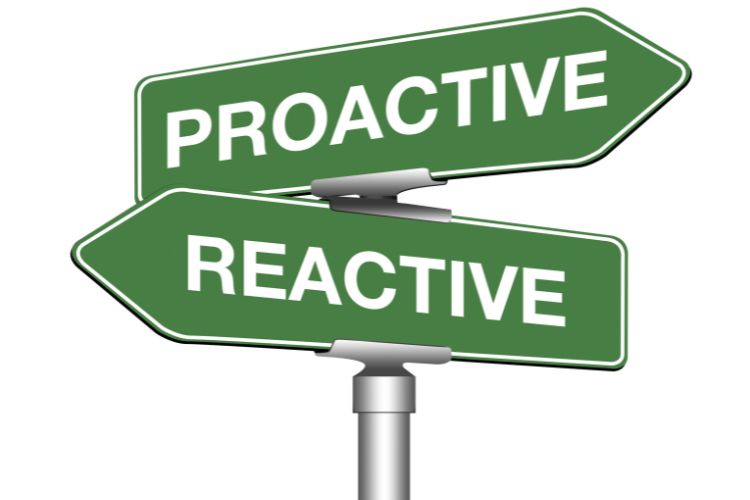Are You Proactive or Reactive?

“The best defense is a good offense” is a maxim that everyone has heard. But a better position to come from is to never have the problem in the first place. How do you do this? By being proactive.
Proactive means that if you smell the handwriting on the wall: leave! Leave before you get fired. As I often say, “You can get another job, but you can’t get another license.”
Proactive also means that you are not taking shortcuts, that you’re crossing your t’s and dotting your i’s and making sure you follow your facility’s policies and procedures. Proactive also means that if a client’s condition is deteriorating that you should respond immediately rather than wait until the patient codes. It’s important to get the rapid response team in early. By being proactive, you can significantly impact patient outcomes, workplace efficiency, and professional satisfaction.
Proactive nurses anticipate potential problems and implement preventive measures, while a “reactive” nurse responds to problems only after they arise. Shifting from a reactive to a proactive mindset will help you immensely in your practice.
A proactive nurse is one who anticipates changes and doesn’t wait as a patient’s condition deteriorates but intervenes early. A proactive nurse is always prepared and maintains a state of readiness. She’s/he’s sure to have everything she/he needs, including supplies, equipment, and keeping up with continuing education. A proactive nurse maintains effective communication with the healthcare team, patients, and families so that everyone is informed, reducing the likelihood of misunderstandings or delayed interventions. A proactive nurse asks for help! A proactive nurse uses critical thinking by consistently analyzing situations and potential outcomes to make informed decisions. They recognize subtle cues that may signal a future problem.
And lastly, a proactive nurse uses her time wisely to manage or reduce the stress that comes with rushing to fix a problem that perhaps could have been prevented altogether.
To develop a proactive mindset, I recommend one regularly review patient data. If a previous nurse says a patient had regular bowel sounds and now you don’t hear bowel sounds, that’s a change that needs to be addressed. When you know patterns, you can anticipate patient needs and act accordingly.
Stay informed. By being informed, you can take preventative measures confidently. Collaborating with the care team regularly, productive nurses seek input and offer insights that could prevent future issues.
Reflect and learn from experiences because, if you have a situation that does not turn out the way you want, become a Monday morning quarterback, and figure out what went wrong so you know how to mediate it in the future.
Being proactive in nursing isn’t just about staying busy or being prepared, it’s about a mindset that embraces anticipation, readiness, and strategic planning to improve patient care, reduce stress, and elevate your practice to a higher standard.
In this profession, every moment counts. Being proactive can make all the difference in the world, or in a patient’s life.


